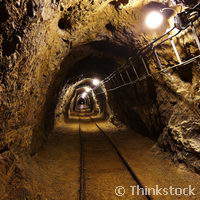Former potash mine to help find life on Mars
Assessing the habitability of Mars and detecting life, if it ever existed, depends on knowing the environment. A potash mine in the North East of England offers an environment similar to that on the surface of Mars and could provide a test bed for technologies for use in the search for life on the Red Planet. Scientists from the new European space exploration programme MASE (Mars Analogues for Space Exploration) will explore Boulby, a mine on edge of the North York Moors National Park, which is 1.3 kilometres deep and contains potash, an agricultural fertiliser. The team of 20 European scientists will investigate how life adapts to Mars-like environments, such as the deep subsurface. They will use the mine to test instruments that might be able to detect living or long-dead Martian microbial life hidden underground. The research programme aims to isolate and characterise non-oxygen-breathing microbes, study their responses to stresses they might have encountered on Mars, and investigate the potential for finding fossilised bugs on the planet. The mine also houses the Boulby Underground Laboratory, a deep underground facility where studies can be conducted without interference from natural background radiation. Professor Charles Cockell, scientific co-ordinator of the project, said, 'If we want to successfully explore Mars, we need to go to Mars-like places on Earth. The deep, dark environment of Boulby mine is the ideal place to understand underground life and test space technologies for the exploration of Mars. In the process, we hope to aid the transfer of high technology from space exploration to safe, effective mining.' The current ability to assess the habitability of Mars is hampered by a lack of knowledge of how the combined effect of different environmental stresses influence the survival and growth of organisms. In particular, many combinations of stress, such as high radiation conditions combined with high salt and low temperature, relevant for early Mars, have not been investigated. Even if life can be shown to be potentially supported on Mars, there exist no systematic studies of how organisms would be preserved. MASE will address these limitations and advance our ability to assess the habitability of Mars and detect life. In the process of doing this, new insights will also be gained into technology transfer from the space exploration sector to the mining industry to improve mining safety and profitable mineral extraction, ensuring that space exploration and technologies directly benefit life on Earth. MASE is a collaborative research project supported for four years (2014-2017) by FP7. The programme is scientifically coordinated by the UK Centre for Astrobiology.
Countries
United Kingdom

